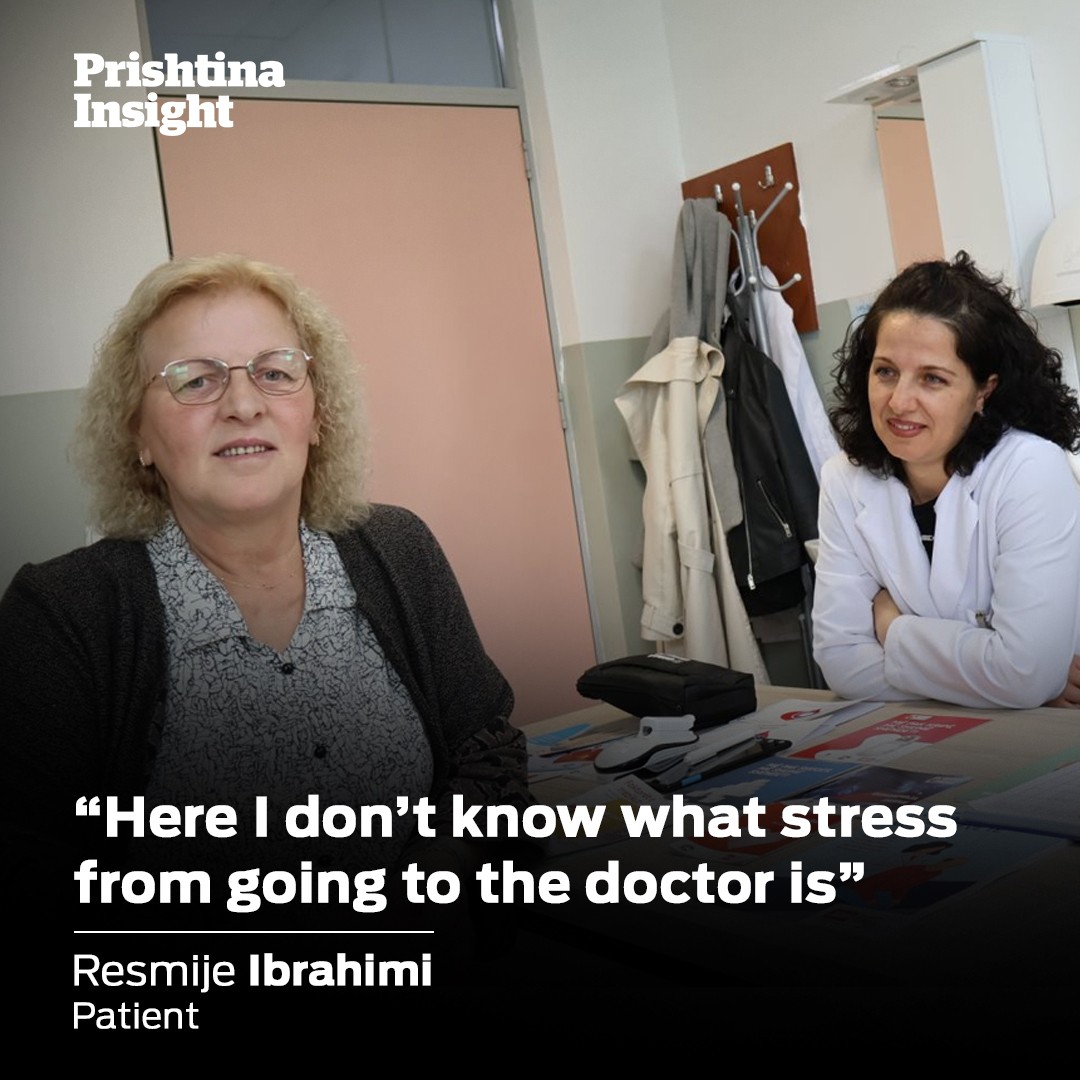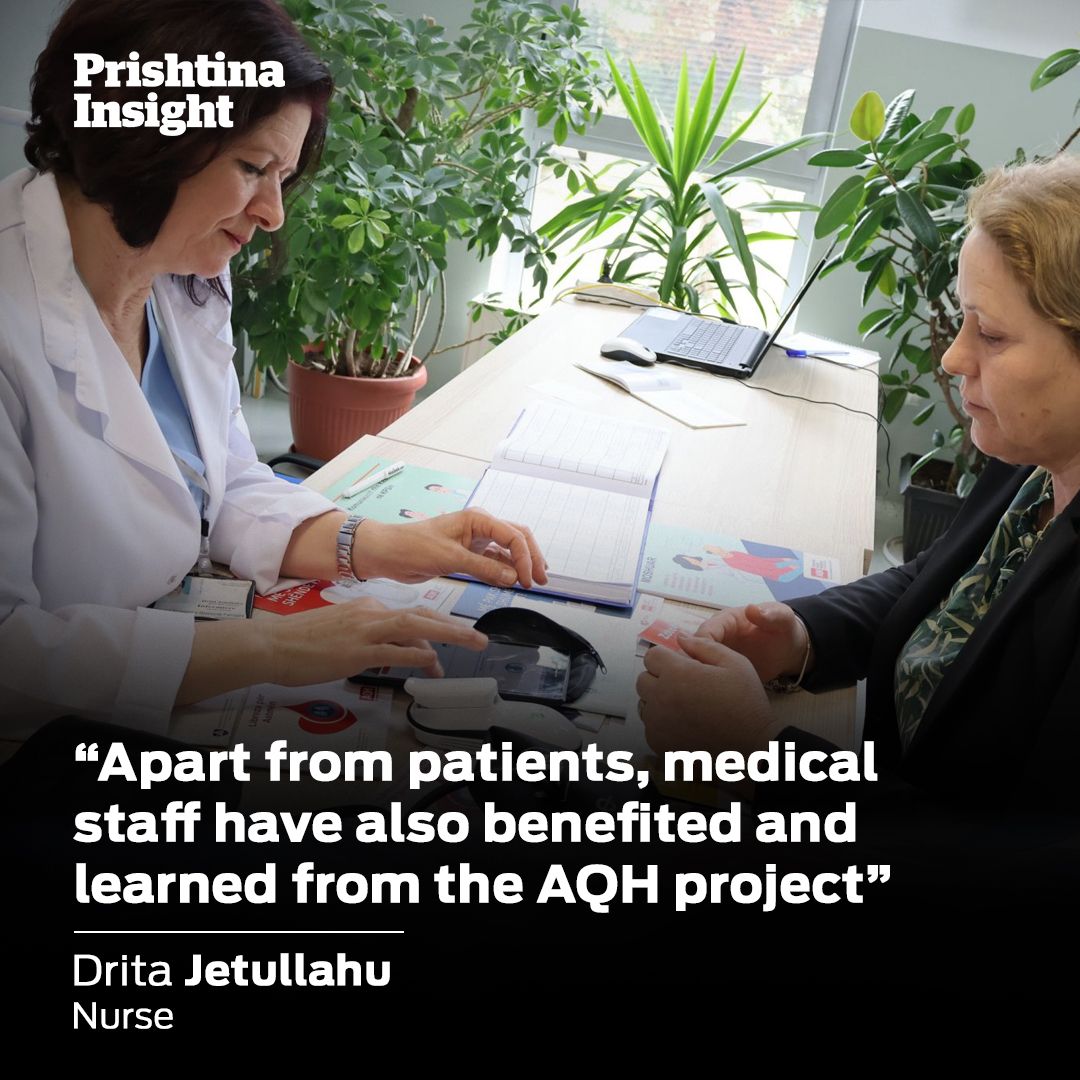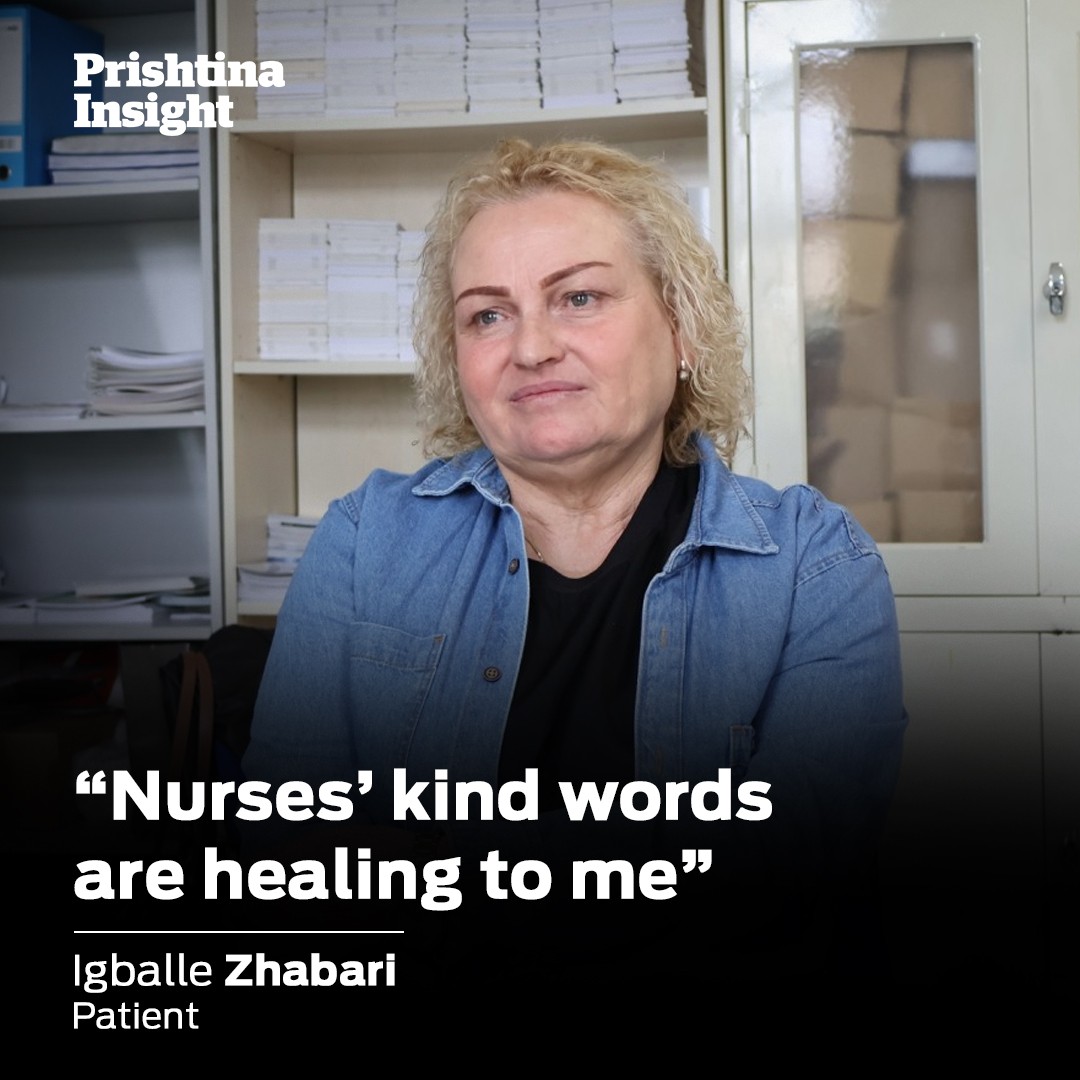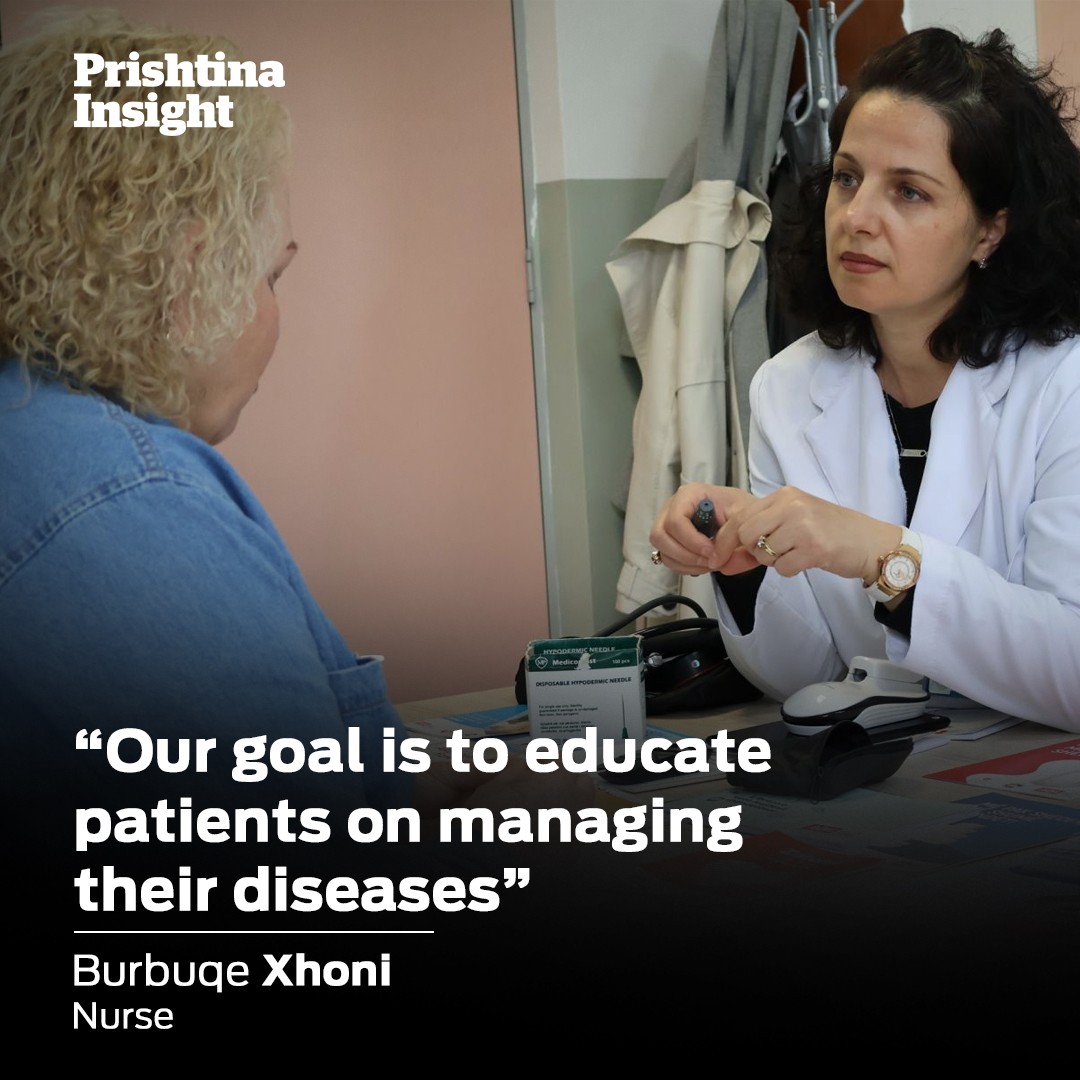In Kosovo, a pioneering project supported by the Swiss Agency for Development and Cooperation is transforming primary healthcare services by training medical staff and establishing Health Education Rooms, providing vital health services and emotional and psychological support for patients with chronic diseases.
Resmije Ibrahimi, a 55-year-old from Vushtrri, has recently found solace in the compassionate care of her local health centre.
“I feel like I’m with family here, I enjoy it, and my health improves because of the positive atmosphere,” she stated while laughing and sharing her daily routine with the nurses.
Resmije’s mood during his frequent routine check ups at the centre has changed significantly since 2016, when Vushrri’s main Family Medical Centre began working with the Swiss Agency for Development and Cooperation. The project aims at transforming primary healthcare services by training medical staff and establishing motivational education rooms, providing not only vital health services but also emotional and psychological support for patients with chronic diseases.
The Accessible Quality Healthcare, AQH, project is aligned with the national reform agenda and complements other donor-supported programs focusing on Primary Health Care, PHC, and non-communicable diseases, NCDs. Since 2016, it has benefited dozens of municipalities and national institutions in Kosovo responsible for ensuring the quality of PHC services.
Family Atmosphere in Vushtrri Counselling Centre

Patient Resmije Ibrahimi (L) expresses satisfaction with the service she receives in the Health Education Room in Vushtrri, Photo: Ardita Zeqiri/BIRN
AQH has played a pivotal role in reforming primary healthcare and opening Health Education Rooms in several municipalities across Kosovo. The training offered by AQH aims to empower nurses to help patients change their habits and lifestyles, better manage their diseases, and even prevent them in some cases.
In Vushtrri, with AQH’s support, an educational room was opened for citizens with non-communicable chronic diseases. Here, patients receive health information and spend part of their day with nurses.
“I weighed 104 kilos five years ago when this health education rooms opened, now I weigh 91 kilos. All thanks to the nurses’ advice. After my visit here, I walk home instead of taking transport,” Ibrahimi said.
She explained that she no longer knows “what stress from going to the doctor is,” saying that the consultations prior to this project were much quicker because of the lack of time for detailed discussions with doctors.
Innovations in Primary Healthcare

Nurse Drita Jetullahu (L) giving routine health check-up to patient Sadete Gela (R) in Vushtrria health education room, Photo: Ardita Zeqiri/BIRN
Drita Jetullahu, a nurse in the Vushtrri motivational health education room says that medical staff have also benefited from the AQH project, as they were trained how to best communicate the diagnoses to patients while not inflicting panic on them.
“We’ve learned things that perhaps we didn’t pay attention to before. As a family doctor, you don’t have time for this type of counselling because of the many patients waiting. If I don’t explain something to a patient, I feel like I owe them,” she added while performing routine checks on patients’ sugar levels, blood pressure, weight, and giving advice on physical activity.
Patients in these health education rooms receive a health booklet, which serves as a record of their health parameters such as sugar levels, blood pressure, and weight. In cases where a patient’s condition is more serious, they are referred to secondary or tertiary care.
The AQH project has facilitated the training of primary care nurses who then work at the health education rooms established with AQH’s help.
Nurse Burbuqe Gjoni emphasised that their main goal is to “educate patients about their disease and how to manage it”.
Igballe Zhabari, a 57-year-old woman, expressed that the nurses’ kind words are healing to her.
“All the nurses give us very good advice, when I come here, I feel like I’m with my family.”
Model Municipality

Patient Igballe Zhabari expresses that the kind words she receives at health education room in Vushtrri are healing to her, Photo: Ardita Zeqiri/BIRN
The municipality of Lipjan, with about 60,000 residents, is considered a model in this project, thanks partly due to the accompanying infrastructure investments and, notably, the local health system’s management’s commitment, willingness and motivation for collaboration and improvement.
Shkëlzen Hajdini, the health director of Lipjan, stated that good primary care is impossible without empowering nurses and providing quality services.
“Since 2016, we’ve been with AQH, which I believe is one of the best things the municipality has done,” he declared.
“The focus has been on integrated care services, offering services to people with non-communicable chronic diseases and managing them,” Hajdini added.
Lipjan municipality has a multi-sectoral approach regarding infrastructure investment, with walking paths, cycling lanes, and green spaces.
Hajdini also mentioned awareness caravans and information campaigns organised by the municipality to raise residents’ awareness about their general health.
“We also gather feedback from citizens, have established a patient council, and evaluate the communication between patients and doctors. They need to know their rights and responsibilities,” he said.
“Many municipalities come to us seeking to share our experience,” he added.
Growing Interest from Other Municipalities

Nurse Burbuqe Gjoni (R) emphasises that their main goal as medical staff is to educate patients about their diseases and teach them how to manage it, Photo: Ardita Zeqiri/BIRN
The 4-year phase of AQH (III phase) began in January 2024 and is set to conclude in December 2027. Vitia, a municipality in eastern Kosovo, has shown interest in collaborating with the AQH project to train nurses and provide educational counselling, following the success seen in other municipalities and the positive reception from citizens, especially those from vulnerable groups.
“When I saw the closeness between citizens and nurses in other municipalities and the opportunity for comprehensive health checks in a different approach from our daily practice, I wanted to have the same thing here” Vjollca Kadolli, director of the Main Family Medicine Center in Vitia, stated.
In 2014, Kadolli opened a health education room for diabetes and hypertension, but it closed due to financial instability.
Kadolli believes that training nurses will change their behaviour towards patients, who are often emotionally burdened and have various problems they may not even discuss with their families.
“Chronic patients need a lot of emotional and psychological support”, she concluded.
Disclaimer: This article has been produced with financial support by AQH.
Please enable JavaScript to view the comments powered by Disqus.